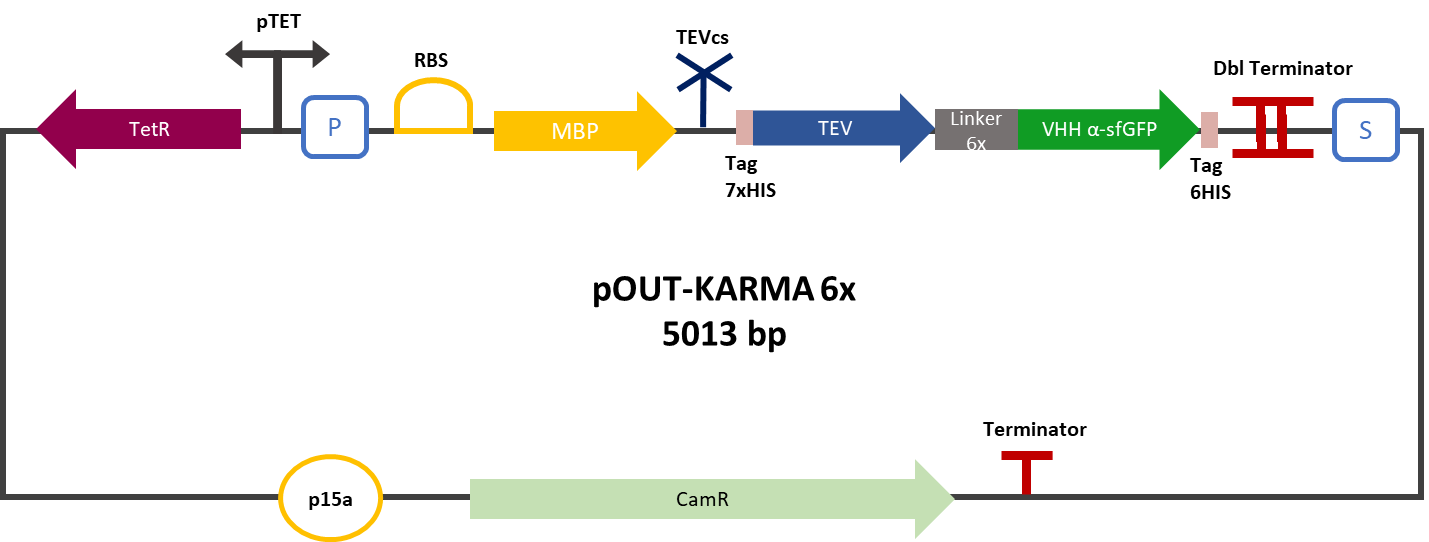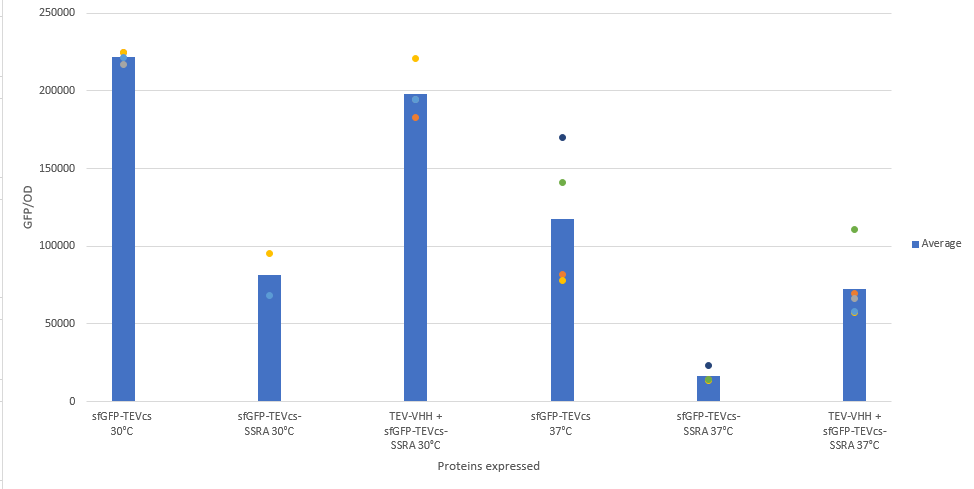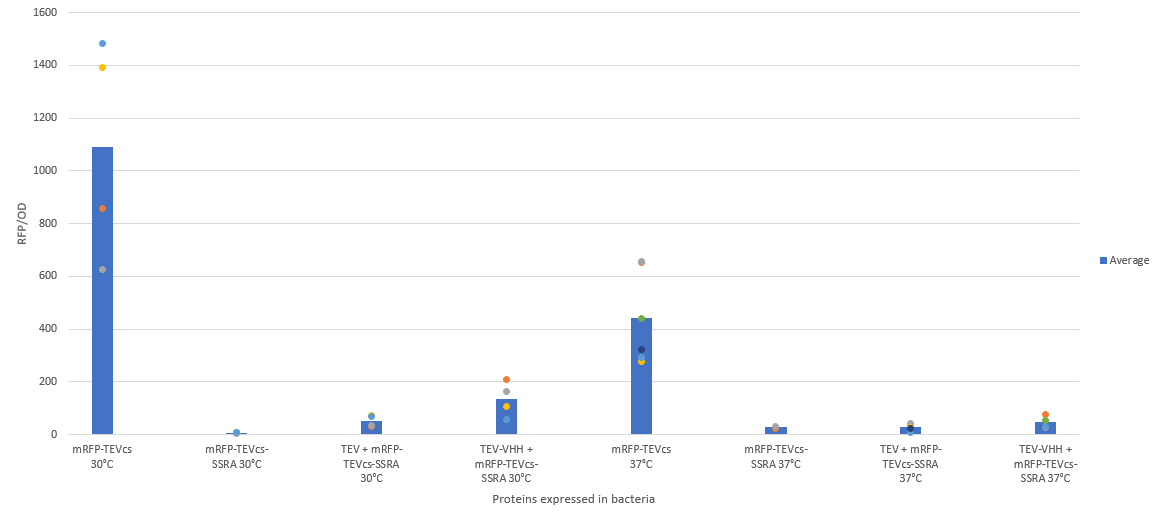Difference between revisions of "Part:BBa K3147009"
| Line 2: | Line 2: | ||
__NOTOC__ | __NOTOC__ | ||
<partinfo>BBa_K3147009 short</partinfo> | <partinfo>BBa_K3147009 short</partinfo> | ||
| + | |||
| + | ===I : parts BBa_K3147009 (MBP-TEVcs-TEV-VHH anti-sfGFP) function :=== | ||
The Montpellier 2019 team made this structure in order to be able to compare the basal activity of the TEV protease (BBa_ K1319004) with the same fused protease to a VHH-type antibody This construction produces an MBP fused to a TEV protease attached to a specific VHH of the sfGFP . Between the MBP and the protease a TEV cutting site (BBa_ J18918) is added. MBP increases the solubility of the fusion protein [1] preventing the aggregation of the protein of interest, this stabilizes the expression, the sequence of the produced MBP does not have a peptide signal which allows to keep the protein in the cytosol. The TEV cutting site allows the separation of MBP from TEV once the protein is produced, in fact the TEV protease is capable of self-cleavage to remove MBP [2]. An affinity tag 7 histidine is added in N-ter of the TEV protease that can allow us to see the separation activity of the TEV by a Western-Blot. | The Montpellier 2019 team made this structure in order to be able to compare the basal activity of the TEV protease (BBa_ K1319004) with the same fused protease to a VHH-type antibody This construction produces an MBP fused to a TEV protease attached to a specific VHH of the sfGFP . Between the MBP and the protease a TEV cutting site (BBa_ J18918) is added. MBP increases the solubility of the fusion protein [1] preventing the aggregation of the protein of interest, this stabilizes the expression, the sequence of the produced MBP does not have a peptide signal which allows to keep the protein in the cytosol. The TEV cutting site allows the separation of MBP from TEV once the protein is produced, in fact the TEV protease is capable of self-cleavage to remove MBP [2]. An affinity tag 7 histidine is added in N-ter of the TEV protease that can allow us to see the separation activity of the TEV by a Western-Blot. | ||
| − | + | [[File:designK3147009.png|650px]] | |
Figure 1 : Construct Design: MBP-TEVcs-TEV-VHH with TEV cutting site. The objective of the construction is to be able to compare the activity of a TEV protease alone versus a TEV protease fused to a VHH. | Figure 1 : Construct Design: MBP-TEVcs-TEV-VHH with TEV cutting site. The objective of the construction is to be able to compare the activity of a TEV protease alone versus a TEV protease fused to a VHH. | ||
| + | ===II. Proof of function=== | ||
| + | |||
| + | The construction was cloned by Gibson Assembly in a backbone pOUT18 under the control of a TET ON promoter, in order to control its expression. The TEV protease used is optimized for expression in E. coli. The sequence contains cleavage mutation, S219V anti-self-cleavage. The TEV protease is a highly specific cysteine protease of the tabacco ech virus sequence. The protease is highly specific for the consensus sequence for its cleavage site which is ENLYFQ\G (BBa_ J18918) with \ indicating cleaved peptide binding. The VHH is a VHH directed against the sfGFP, it recognizes a conformational pattern. | ||
| + | |||
| + | [[File:plasmideK3147009.png|450px]] | ||
| + | |||
| + | Figure 2: MBP-TEV-VHH reporter gene in its backbone pOUT18. | ||
| + | |||
| + | The experimental approach to test protease activity is to compare the fluorescence restoration rate of sfGFP as a function of MBP-TEV and MBP-TEV fused to a VHH. In this experiment, basal controls of maximum and minimum fluorescence of reporter genes were used. Fluorescence data are normalized by the fluorescence divided by the optical density. The specificity of the VHH was also tested, for which we used the reporter gene mRFP1-TEVcs-SSRA (BBa_ K3147003) and mRFP1-TEVcs (BBa_ K3147004). The objective was to see if the activity of the TEV was improved by anchoring the TEV close to its cleavage site using the VHH. For this purpose we measured the fluorescence restoration rates between NEB10β strains of E. coli, co-transformed with the reporter genes mentioned above. The protease is expressed by inducing the TET promoter with 50ng/mL of aTc (anhydrotetracycline). | ||
| + | |||
| + | [[File:resultsfGFPK3147009.png|500px]] | ||
| + | |||
| + | Figure 3 : Efficiency of TEV-VHH by measuring the fluorescence recovery with a sfGFP linked to a proteolysis tag by a TEV recognition site | ||
| + | |||
| + | [[File:resultRFPK3147009.png|500px]] | ||
| + | |||
| + | Figure 4 : Efficiency of TEV-VHH by measuring the fluorescence recovery with a mRFP linked or not to a proteolysis tag by a TEV recognition site | ||
| + | |||
| + | ==Reference== | ||
| + | |||
| + | [1] Raran-Kurussi, Sreejith, et David S. Waugh. 2012. « The Ability to Enhance the Solubility of Its Fusion Partners Is an Intrinsic Property of Maltose-Binding Protein but Their Folding Is Either Spontaneous or Chaperone-Mediated » éd. Bostjan Kobe. PLoS ONE 7(11): e49589. | ||
| + | |||
| + | [2] Shih, Y.-P. 2005. « Self-Cleavage of Fusion Protein in Vivo Using TEV Protease to Yield Native Protein ». Protein Science 14(4): 936‑41. | ||
| + | |||
| + | [3] Yi, L. et al. 2013. « Engineering of TEV Protease Variants by Yeast ER Sequestration Screening (YESS) of Combinatorial Libraries ». Proceedings of the National Academy of Sciences 110(18): 7229‑34 | ||
| + | |||
| + | [4] Kubala, M. H., Kovtun, O., Alexandrov, K., & Collins, B. M. (2010). Structural and thermodynamic analysis of the GFP:GFP-nanobody complex. Protein science : a publication of the Protein Society, 19(12), 2389–2401. doi:10.1002/pro.519 | ||
<!-- Add more about the biology of this part here | <!-- Add more about the biology of this part here | ||
Revision as of 08:28, 14 October 2019
TEV protease fused to anti-sfGFP VHH with TEV-cleavable maltose binding protein
I : parts BBa_K3147009 (MBP-TEVcs-TEV-VHH anti-sfGFP) function :
The Montpellier 2019 team made this structure in order to be able to compare the basal activity of the TEV protease (BBa_ K1319004) with the same fused protease to a VHH-type antibody This construction produces an MBP fused to a TEV protease attached to a specific VHH of the sfGFP . Between the MBP and the protease a TEV cutting site (BBa_ J18918) is added. MBP increases the solubility of the fusion protein [1] preventing the aggregation of the protein of interest, this stabilizes the expression, the sequence of the produced MBP does not have a peptide signal which allows to keep the protein in the cytosol. The TEV cutting site allows the separation of MBP from TEV once the protein is produced, in fact the TEV protease is capable of self-cleavage to remove MBP [2]. An affinity tag 7 histidine is added in N-ter of the TEV protease that can allow us to see the separation activity of the TEV by a Western-Blot.
Figure 1 : Construct Design: MBP-TEVcs-TEV-VHH with TEV cutting site. The objective of the construction is to be able to compare the activity of a TEV protease alone versus a TEV protease fused to a VHH.
II. Proof of function
The construction was cloned by Gibson Assembly in a backbone pOUT18 under the control of a TET ON promoter, in order to control its expression. The TEV protease used is optimized for expression in E. coli. The sequence contains cleavage mutation, S219V anti-self-cleavage. The TEV protease is a highly specific cysteine protease of the tabacco ech virus sequence. The protease is highly specific for the consensus sequence for its cleavage site which is ENLYFQ\G (BBa_ J18918) with \ indicating cleaved peptide binding. The VHH is a VHH directed against the sfGFP, it recognizes a conformational pattern.
Figure 2: MBP-TEV-VHH reporter gene in its backbone pOUT18.
The experimental approach to test protease activity is to compare the fluorescence restoration rate of sfGFP as a function of MBP-TEV and MBP-TEV fused to a VHH. In this experiment, basal controls of maximum and minimum fluorescence of reporter genes were used. Fluorescence data are normalized by the fluorescence divided by the optical density. The specificity of the VHH was also tested, for which we used the reporter gene mRFP1-TEVcs-SSRA (BBa_ K3147003) and mRFP1-TEVcs (BBa_ K3147004). The objective was to see if the activity of the TEV was improved by anchoring the TEV close to its cleavage site using the VHH. For this purpose we measured the fluorescence restoration rates between NEB10β strains of E. coli, co-transformed with the reporter genes mentioned above. The protease is expressed by inducing the TET promoter with 50ng/mL of aTc (anhydrotetracycline).
Figure 3 : Efficiency of TEV-VHH by measuring the fluorescence recovery with a sfGFP linked to a proteolysis tag by a TEV recognition site
Figure 4 : Efficiency of TEV-VHH by measuring the fluorescence recovery with a mRFP linked or not to a proteolysis tag by a TEV recognition site
Reference
[1] Raran-Kurussi, Sreejith, et David S. Waugh. 2012. « The Ability to Enhance the Solubility of Its Fusion Partners Is an Intrinsic Property of Maltose-Binding Protein but Their Folding Is Either Spontaneous or Chaperone-Mediated » éd. Bostjan Kobe. PLoS ONE 7(11): e49589.
[2] Shih, Y.-P. 2005. « Self-Cleavage of Fusion Protein in Vivo Using TEV Protease to Yield Native Protein ». Protein Science 14(4): 936‑41.
[3] Yi, L. et al. 2013. « Engineering of TEV Protease Variants by Yeast ER Sequestration Screening (YESS) of Combinatorial Libraries ». Proceedings of the National Academy of Sciences 110(18): 7229‑34
[4] Kubala, M. H., Kovtun, O., Alexandrov, K., & Collins, B. M. (2010). Structural and thermodynamic analysis of the GFP:GFP-nanobody complex. Protein science : a publication of the Protein Society, 19(12), 2389–2401. doi:10.1002/pro.519
Sequence and Features
- 10COMPATIBLE WITH RFC[10]
- 12COMPATIBLE WITH RFC[12]
- 21COMPATIBLE WITH RFC[21]
- 23COMPATIBLE WITH RFC[23]
- 25COMPATIBLE WITH RFC[25]
- 1000INCOMPATIBLE WITH RFC[1000]Illegal BsaI site found at 77
Illegal BsaI.rc site found at 2398
Illegal SapI.rc site found at 1541
Illegal SapI.rc site found at 1889




